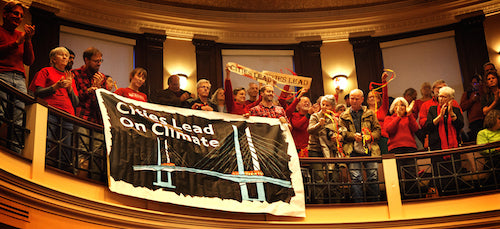Portland's fossil fuel policy & an anti-capitalist analysis of climate change

This policy prevents the construction of infrastructure to transport or store industrial quantities of coal, oil, and gas in Portland. As Oregon and the Pacific Northwest are currently being developed into a fossil fuel corridor—with the potential to transport as much carbon annually as 5 Keystone XL pipelines—this policy is especially impactful.

Portland's prescient focus on infrastructure points to Andreas Malm's fothcoming Fossil Capital:
For the foreseeable future – indeed, as long as there are class societies on earth – there will be lifeboats for the rich and privileged, and there will not be any shared sense of catastrophe. More than ever, class divisions will become matters of life and death: who gets to drive out of the city when the hurricane approaches; who can pay for seawalls or homes solid enough to withstand the coming flood. The capitalist class is evidently not very worried. Quite a few fractions of it are rather gearing up for some sweet profits from newly available oil resources in the Arctic, desalination plants and floating cities, ownership of ever more precious land, the construction of walls, fire insurances, genetically modified crops to withstand the heat, geoengineering.8 As in all crises of capitalism, this one presents a welter of opportunities for those in clover, and après moi, le déluge. (391)
There is, then, another way to measure CO2: as an effluent of power, of our defeats and their victories. But this requires a conception of history very different from that established in climate change discourse.
–The trope of the undifferentiated we does violence to the historical record.
From this historical standpoint, climate change is not so much a sur- prising reversal of fortunes as a lifting of the veil on two centuries of fossil capital
